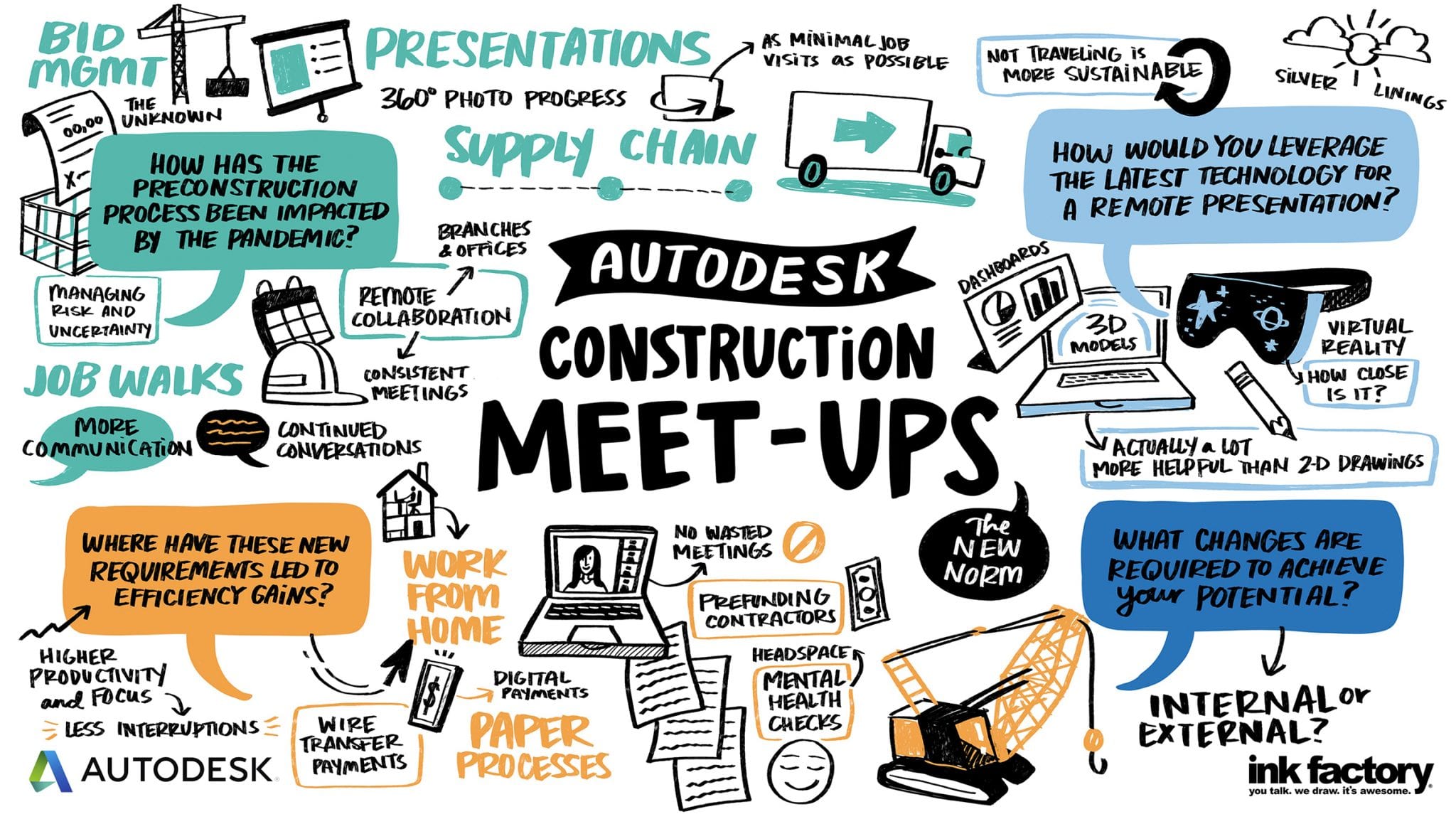Help us improve your experience. See content that is made for you!
See how IBM increased their efficiency by up to 30%!

Help us improve your experience. See content that is made for you!
See how IBM increased their efficiency by up to 30%!


Educational and networking events can do wonders for your professional life. Events such as webinars and meetups offer tremendous learning opportunities, which can be invaluable when developing someone's construction career.
But it's not just about acquiring knowledge and skills. With the right format, learning and networking events can give attendees insights into what their peers are going through, which can ultimately help them feel and stay connected.
We saw all these benefits first-hand in the recent Autodesk Construction Meetups that took place at Autodesk University 2020. We held four meetups in total, with each event focusing on the following groups:
These meetups were intended to bring industry peers together to discuss common challenges and countermeasure tactics. We recognize that AEC professionals are each facing their own shared pains driven by siloed communication and unreliable data, so we wanted to offer a platform to discuss these issues.
We're pleased to report that the Autodesk Construction Meetups ended up being a huge success. Attendees throughout all four groups had productive conversations, and folks felt good just sharing their stories and recognizing that others were going through the same things.
We've also gotten feedback that people picked up new ideas and strategies on how they could connect people, processes, and technologies to address the industry challenges that they were facing.
A lot of insights were shared, and we compiled some of the top highlights and takeaways below.
A common point that came up in our meetups was the fact that people were experiencing higher levels of stress during the pandemic. Most attendees were concerned that their work had picked up so much, and they were facing burnout and a lack of productivity.
And while these problems existed prior to COVID-19, the pandemic exacerbated them, and people were forced to really address the issues.
This is where a silver lining — in the form of technology — came in. The lack of productivity that people faced prodded companies to adopt technology and launch digital transformation initiatives. Whether it was PlanGrid adoption or BIM 360, we got a lot of feedback on how these programs were gaining more traction in organizations.
One example that we saw multiple times was the use of 360 photos. People were attaching 360 photos to drawings, so they didn't have to go to a jobsite and conduct site walks.
There were folks who were initially resistant to these tools, but the good news is that once they adopted the technology, they saw the benefits and couldn't be happier.
Mental health was another common theme that was brought up during the meetups. Attendees shared their struggles when it came to Zoom fatigue, the inability to travel, and working from home with kids.
Having people reveal their stories and concerns allowed folks to gain new perspectives and view things from different angles. In the end, the sessions helped everyone gain a new level of respect and vulnerability.
This is quite valuable because increased empathy leads to increased trust, leading to improved performance, according to a recent Autodesk and FMI report on trust.
Plus, it allowed attendees to learn the strategies that other companies are using to promote mental health so they can apply similar practices in their firms.
One thing that everyone agreed on was the need for more transparency and communication. Now that we're working remotely, people have to communicate more effectively. This requires significantly greater access and visibility to data and information.
Technology can be a big help in this area. For example, when it comes to supply chain visibility, solutions like Autodesk Forge allow designers, contractors, and owners to directly exchange and aggregate data with less effort in less time - not to mention you don't have to track project assets or go to the factory or jobsite. If trust in transparency is not a core tenant of your business, you're not ready for the new normal.
Webcams can be a great way to promote transparency and engagement during remote meetings. However, there was also talk about how folks were experiencing webcam anxiety because of privacy and general concerns about being exposed at home to your colleagues with your kids or dog ready to barge in at any moment.
Even these 'new normal' stressors can be alleviated by new technology like virtual reality. VR devices such as the Oculus Quest are enabling project team members to create look alike avatars of themselves and join a virtual meeting room in Spatial.io. This allows even the most socially anxious the opportunity to interact remotely and show complete engagement without the need to turn on a webcam.
An interesting point of discussion during the meetups was the rise of cognitive computing — i.e., artificial intelligence (AI) and machine learning (ML). These technologies have been making waves in the industry for a while now, and for good reason: they can be incredibly effective in helping us work smarter and more efficiently.
Meetup attendees shared examples of how they're leveraging AI. From using BIM 360 Insights to look at subcontractor and employee performance to deploying a bot that sends out text messages of wellness checks, there are certainly a lot of interesting cases of AI and machine learning in action.
And we're bound to see more developments going forward. Global AI in construction was valued at 398.6 million in 2018 and is projected to have a Compound Annual Growth Rate of 34% from 2019 to 2025.
We're clearly moving towards more cognitive computing, and it's high time that firms gear up for the continued rise of these technologies.
That being said, one of the keys to getting the most out of artificial intelligence and machine learning is to be more open about our mistakes. Cognitive computing learns from mistakes, so trying to erase or white-out errors actually limits the capabilities of AI and ML.
Unfortunately, the reality is we're not always incentivized (contractually) to admit mistakes. While this is something we must all advocate for collectively, this shouldn't prevent us from changing the culture at the company level to become more transparent and autonomous.
Speaking of which, innovation was a huge topic in our meetup discussions, and we specifically talked about how to address issues that inhibit innovation. Factors such as internal resistance to change or government forces are just a few things that can curb progress.
The first step to overcoming these inhibitors is to analyze the root cause and recognize which challenges are in your control. Are you facing an issue that you can act on? That's a barrier. Have you heard "no" 10 times from internal management or external clients blocking your path to success? Well, that's a roadblock. Barriers you can typically talk your way through them (if you're good). Roadblocks, on the other hand, are not moving and force stakeholders to go around.
There are both social and technical components to digital transformation, and navigating them can be tricky. We've found that many folks are struggling with both the technical and non-technical aspects of technology adoption, so we expect these matters to be common themes throughout our upcoming meetups.
The recent Autodesk Construction Meetups were packed with insights that can put construction firms — and the industry as a whole — on the path towards progress and innovation. That's why we're excited to host these on a regular basis.
If you'd like to join the conversation at our upcoming construction meetups, register here. We'll be hosting them virtually on a bi-monthly basis, and each meetup gives you a chance to share your stories while hearing ideas and lessons from your peers. We have four upcoming meetups in January for:
We'd love to have you, so sign up today!

May we collect and use your data?
Learn more about the Third Party Services we use and our Privacy Statement.May we collect and use your data to tailor your experience?
Explore the benefits of a customized experience by managing your privacy settings for this site or visit our Privacy Statement to learn more about your options.